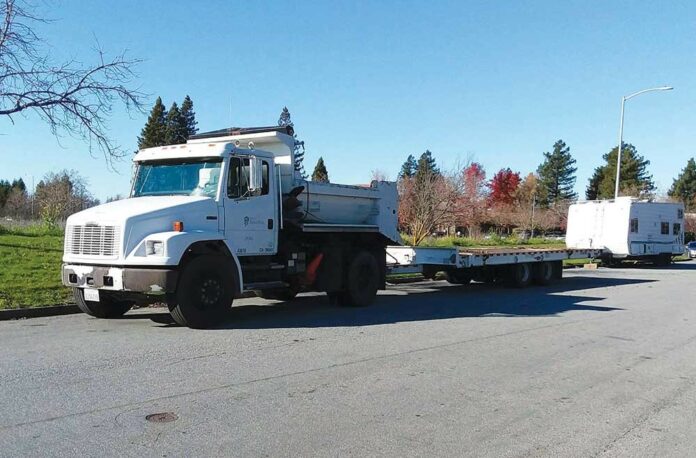At a meeting on Jan. 28, the Santa Rosa City Council took two disparate steps. First, it approved an amendment to a contract with a local company which tows and stores vehicles, some of which people live in. Next, it discussed the possibility of expanding a long-running program to offer “safe parking” spaces for people living in their vehicles.
The county’s latest homeless count, conducted in late January 2019, states that, of the 2,951 people experiencing homelessness in the county, 29 percent live in vehicles.
According to the same count, there are 1,661 homeless people within Santa Rosa’s city limits—more than half of the total homeless in the whole county.
Local supporters of safe parking and sanctioned encampments—properties, often publicly owned, where people without shelter can stay without fear of law enforcement action—believe they give homeless people
an opportunity to get back into permanent housing.
Both Santa Rosa and Sonoma County have long opposed implementing sanctioned encampments or safe parking at a meaningful scale. Instead, officials have largely argued for a Housing First model which calls for constructing new housing units to house homeless people.
While Housing First might offer the best form of long-term shelter, critics point out that thousands of people will be left on the streets with no formal shelter while the county attempts to build thousands of additional housing units.
That stance may be changing. Following the highly-publicized stand-off at Joe Rodota Trail, the county approved a temporary, sanctioned encampment at Los Guilicos and will discuss the possible location of a safe parking lot.
At the Jan. 28 council meeting, Santa Rosa appeared to be moving in the same direction.
The city council discussed the possibility of expanding its safe parking pilot program, known as Community Homeless Assistance Program (CHAP). CHAP has been in operation since October 2015, when it was first approved as a year-long pilot program. The program allows local churches and other private property owners to let people living in their vehicles stay in parking lots.
In Nov. 2016, the city council formalized the program and set aside $20,000 to pay property owners hoping to join the program. To date, the city has paid two churches a total of $13,890, according to a staff report from the Jan. 28 meeting. Three churches are participating in the program, offering approximately 30 parking spots where people can park overnight.
“The estimate [by Catholic Charities, one of the city’s nonprofit contractors] to operate a 100-spot, scattered-site program, overnight (8pm to 7am) with comprehensive services (housing-focused) is approximately $530,000 annually,” the staff report states.
At the same time, the city has continued its policy of towing recreational vehicles around the city, sometimes resulting in a person losing their vehicle permanently.
At the Jan. 28 meeting where they discussed expanding the safe parking program, the council approved a $100,000 extension to the city’s contract with Cream’s Towing, a local company which has long offered services to Sonoma County and local cities.
The addition would bring the city’s total spending on towing vehicles to $295,000 since the contract was first approved in 2018. That’s far more than the council ever gave to CHAP, the safe parking pilot program.
In order to recover their vehicle, a person must pay the Santa Rosa Police Department a $200 “recovery fee” on top of the tow and storage fee charged by Cream’s Towing. Sgt. Josh Ludtke, head of the police department’s traffic division, says the recovery fee varies depending on the reason they towed the vehicle. For instance, the city doesn’t charge to release a stolen vehicle.
If an individual is unable to pay to release their vehicle, they may end up living on the street, in a tent or in a homeless shelter.
Alicia Roman, an attorney who represents local homeless people, says the practice of towing vehicles people are using as housing is “counterproductive.”
“Citing and towing vehicles for parking violations makes them less likely to transition to stable housing and creates a dangerous situation by leaving them exposed and vulnerable out in the streets,” Roman said.
According to a Jan. 28 staff report, the number of recreational vehicles towed in recent years has exceeded expectations, leading to increased costs for the city.
“Funding for this contract has well exceeded historical annual spend levels for these services,” the staff report states. “There were several large-scale clean-up and disposal projects that have exhausted all previous approved funds.”
Under Cream’s contract with the city, the towing company will tow and store all small vehicles without additional fees, but tacks on additional fees for recreational vehicles.
Cream’s charges the city between $1,500 and $3,500 to tow and store an RV depending on the size of the vehicle, according to the amended contract.
It’s not clear how much Cream’s charges vehicle owners for storage and towing fees. The company does not publish the information on its website and did not respond to multiple requests for comment.
Ludtke says the city cannot regulate the amount tow companies charge because the California Highway Patrol regulates costs statewide.
In an interview, Brandalyn Tramel, the city’s purchasing agent, confirmed that the expanding cost of the contract was due to the increase in the number of large vehicles Cream’s towed, the only uncontrolled cost in the contract.
Ludtke acknowledges that towing a vehicle could pose a serious problem for someone using it as shelter. However, he says the larger solution to the problem is something policymakers at all levels need to find solutions to. It is the police department’s duty to respond to complaints, Ludtke says.
Vice Mayor Victoria Fleming, a supporter of the proposed expansion of safe parking, did not respond to a request for comment.
In San Francisco, lawmakers are considering reducing tow fees for those who can prove they are homeless to just $100.









